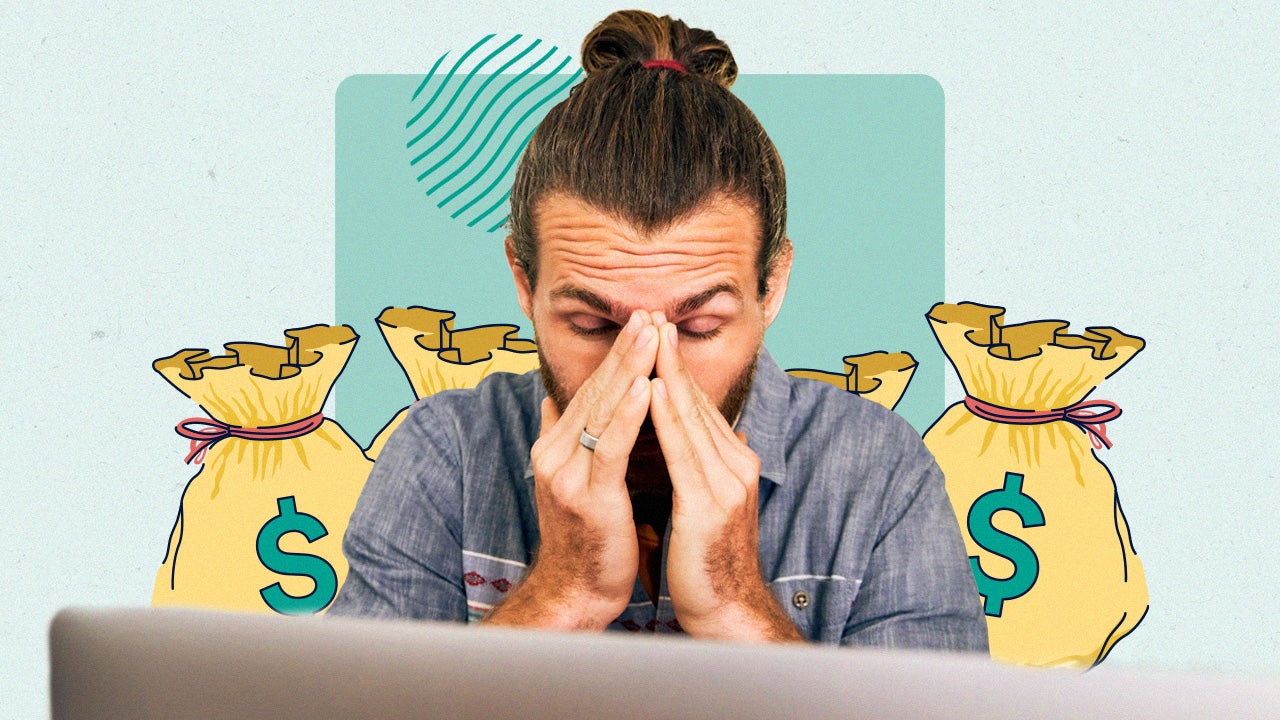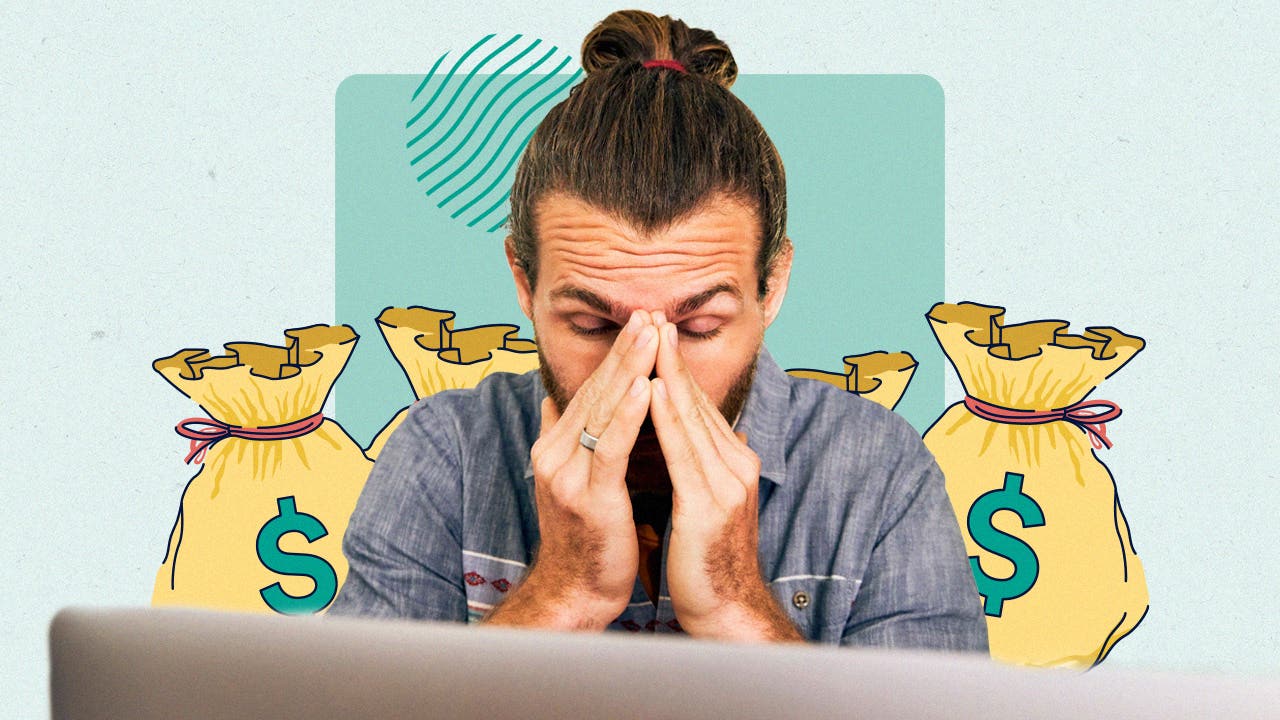The mental toll of debt and how to navigate it



It’s no surprise that debt can have a major impact on your mental health. Your balance, the accumulating interest, making monthly payments and even the circumstances that put you in debt in the first place can all take a toll on how you feel about your finances.
According to a survey by Bankrate, 52 percent of Americans surveyed say money has a negative impact on their mental health.
While it’s clear that finances have an impact on mental health, the opposite is also true. Your mental health can impact your finances, for better or for worse — which is why it’s crucial to manage your debt and your mental wellness and understand the role each has to play in your life.
How debt impacts your mental health
Debt can have an impact on every aspect of your life. While debt’s most direct effect is on your finances, your finances (and the debt itself) can influence your day-to-day decisions, your life events and your overall mental health.
For many, being in debt is enough to put a strain on their mental health. Nearly half (47 percent) of respondents to a Bankrate survey around financial wellness cited debt as having a negative impact on their mental health. In the same survey, 29 percent of respondents said money had a negative impact on their mental health on a daily basis.
Feelings of stress around debt can negatively impact your day-to-day life. Respondents to a National Debt Relief (NDR) survey reported losing an average of over 200 hours of sleep per year — or over 30 minutes nightly — because of their debts.
Those in debt may also end up turning down everyday activities that can provide a source of fun. Respondents to NDR’s survey said they said no to a night out with friends, a date night or even attending a wedding because of their debt.
The long-term impact of mental health and finances
Debt’s impact on your mental health can go beyond lost sleep and missing out on fun activities. The effects can be long-term and much larger.
Debt can change the decisions you make in your life, both large and small. According to the NDR survey, three in five Americans surveyed have considered putting off marriage to avoid taking on their partner’s debt. Over half (54 percent) cite debt as being a major reason to consider divorce.
Having debt can also delay major financial milestones. Debt can impact your credit score which can impact your ability to rent or own property, take out a loan or even get a job. Over half (59 percent) of respondents to a 2022 Bankrate survey stated their student loans caused them to put off building their emergency fund or retirement savings.
Empty emergency savings and retirement accounts can mean you have no monetary cushion for a rainy day or when you leave the workforce which adds an additional layer of stress. Not saving enough for retirement in particular is a leading source of financial regret for Americans, according to Bankrate.
All of this can lead to long-term stress which comes with a variety of consequences. The Mayo Clinic says long-term stress can lead to heart issues, depression, digestive problems, muscle tension and pain, memory issues and headaches.
For many, these stress-related issues can not only have a direct impact on their health, but how they tackle their debt and manage their stress. According to the poll from NDR, 69 percent of respondents said long-term exposure to stress caused them to withdraw from the things that they love, which can add to the cycle of anxiety. Coping mechanisms such as emotional spending can even make the debt worse.
The correlation between debt and stress is clear. However, this does not mean that you can’t manage both your financial health and your mental health. By taking control of your finances and your mental wellbeing, you can help make sure your debt and your stress don’t take over your life.
Ways to manage your debt and your outlook
Having your finances in control is one of the first steps to managing your debt and your mental health outlook if money is one of the sources of your stress.
Managing your finances can help you feel more in control of your debt repayments, as well as managing emergencies or unexpected expenses.
Here are some manageable steps to help you get started.
Having a long-term repayment plan
First, determine your long-term repayment plan. While making the minimum payment on your loan each month might seem manageable, you may want to consider paying off your debt using the avalanche or snowball methods.
Using repayment methods like these can help you strategically focus your money in a way that pays off your debt more quickly and sustainably.
Building an emergency fund
Next, build an emergency fund. An emergency fund can help give you peace of mind for when the unexpected happens, and give you a way to keep making your payment if you lose your job or face an unexpected expense.
Starting small can be a sustainable way to build your fund. One way you can start is by setting a low goal — such as $500 — and saving a little bit every day, before setting your sights on a larger goal of three to six months’ worth of living expenses.
Include room in your budget
Another important factor to consider when paying off debt is to leave room in your budget for the fun things in life.
While paying your bills, managing your debt and building an emergency fund are all important, you don’t have to dedicate 100 percent of your money to your budgetary needs. As we covered, debt can often make borrowers turn down spending time with their friends or attending important events which can take a toll on both your social life and your mental health.
Instead of restricting yourself completely, it’s okay to spend a little money on your favorite coffee, a new pair of shoes or your favorite concert when these little treats can have a positive impact on your overall mental health. Something that brightens your day can go a long way.
Focus on self-care
No matter what level of stress you’re feeling, self-care is an important aspect of managing your mental health outlook.
Checking in with a mental health professional, practicing mindfulness and limiting your social media use are just a few of the ways you can help keep your stress in check.
How and where to find help
Paying off debt doesn’t mean you have to go without support. If you find yourself overwhelmed or if your symptoms of stress are extreme, be sure to seek professional help.
Here are a few other mental health and debt relief resources to consider.
Mental health resources
There are several ways you can access mental health aid and guidance.
A mental health professional such as a licensed therapist, psychiatrist or psychologist can help you navigate the stress you are experiencing. You can even contact a financial therapist for mental health help specifically tailored to financial stress issues.
You can find these individuals on your own or you may be able to access one through your workplace or school depending on the resources they have available.
Some state and local governments can connect you with mental health resources, including classes, free or low-cost therapy sessions, or specialized hotlines that can offer you guidance and point you to further resources.
The federal government also offers free mental health resources online.
- FindTreatment.gov can help you find mental health professionals in the United States.
- VA Mental Health offers mental health resources for military veterans.
- The Substance Abuse and Mental Health Services Administration (SAMHSA) provides resources for those experiencing mental health and substance abuse disorders.
- Centers for Medicare & Medicaid Services can provide resources and help those on Medicare and Medicaid find help with their coverage.
- The CDC contains a variety of educational resources and directions for mental health care.
Be sure to do your research and find resources that are local to you and your state in order to get the care you need at an affordable rate..
If you or a loved one feel suicidal or experience feelings of self-harm because of your financial situation, seek help immediately. Contact the Suicide and Crisis Lifeline at 998, available 24/7, or dial 911.
Debt management resources
Finding help managing your debt can help you get your finances in order and put you in a sustainable position to pay off your loans.
Like therapists, there are professionals who can help you manage your financial wellness.
A financial advisor can help you organize your finances, determine your cash flow and come up with a plan to handle your debt. While financial advisors typically charge fees, you may be able to find pro bono help through the Financial Planning Association or other sources.
Another route you may want to take is finding a certified credit counselor through the National Foundation for Credit Counseling. A credit counselor can help you build a debt repayment plan and find options for managing your debt and financial situation.
Finally, if you cannot make your debt payments, you may want to consider a debt relief company. Debt relief companies like National Debt Relief can help qualified borrowers reduce or eliminate their debt balances by settling with the debt owner, lowering your payments and allowing you to start anew.
The bottom line
Your mental health and financial wellness are two closely-related factors in how you live your life. While debt can be a source of stress and anxiety, it doesn’t have to be. By taking control of your debt, prioritizing your mental health and finding the right resources, you can start on the path to better mental and financial health, one step at a time.
If you are feeling overwhelmed with your debt or your stress, be sure to seek professional help as soon as possible using the resources listed above.
If you want to learn more about managing your finances, mental health and debt repayment plan, check out Bankrate and National Debt Relief’s ongoing article series about all things debt. Watch this space for tips, tricks and exclusive stories from readers like you and their debt repayment journeys.
Why we ask for feedback Your feedback helps us improve our content and services. It takes less than a minute to complete.
Your responses are anonymous and will only be used for improving our website.





